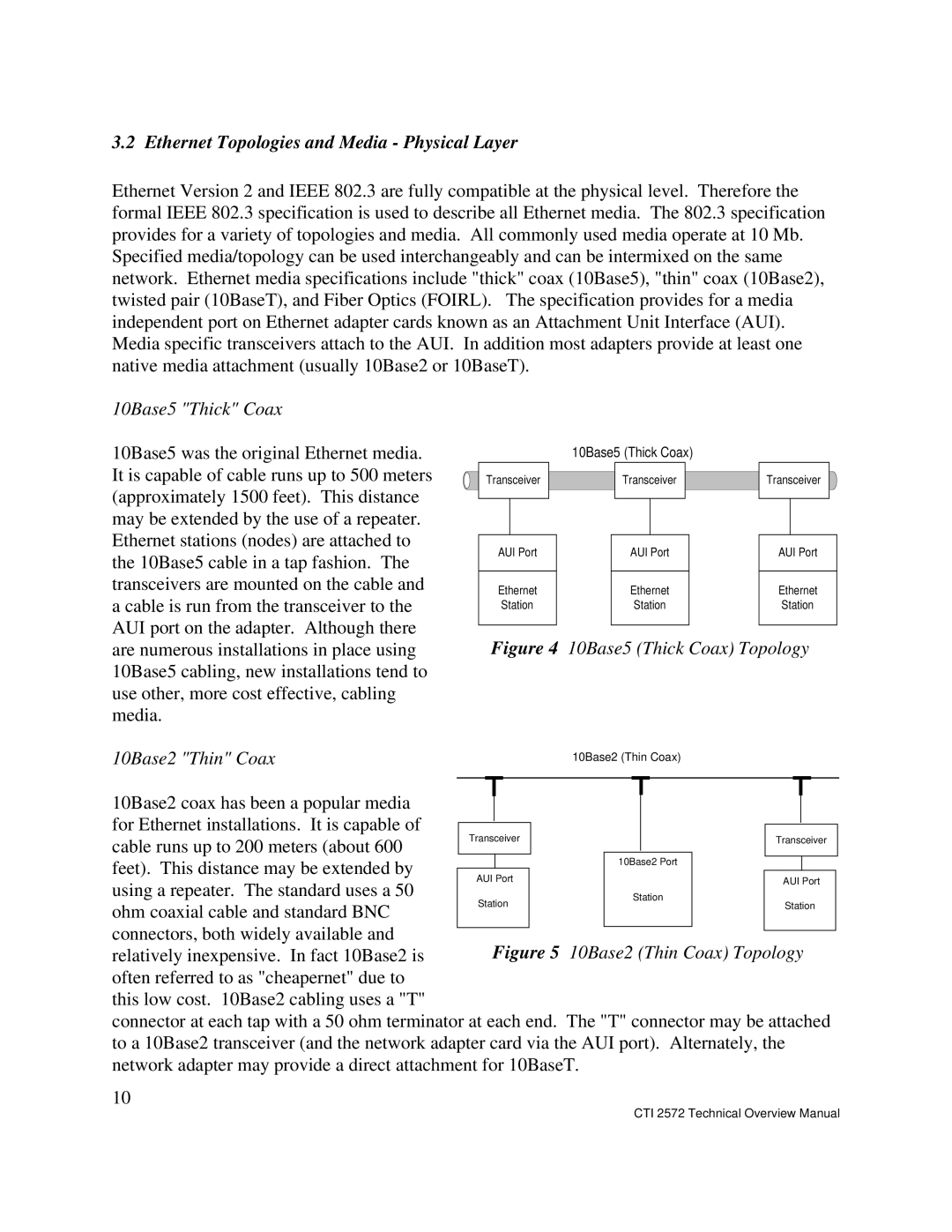
3.2 Ethernet Topologies and Media - Physical Layer
Ethernet Version 2 and IEEE 802.3 are fully compatible at the physical level. Therefore the formal IEEE 802.3 specification is used to describe all Ethernet media. The 802.3 specification provides for a variety of topologies and media. All commonly used media operate at 10 Mb. Specified media/topology can be used interchangeably and can be intermixed on the same network. Ethernet media specifications include "thick" coax (10Base5), "thin" coax (10Base2), twisted pair (10BaseT), and Fiber Optics (FOIRL). The specification provides for a media independent port on Ethernet adapter cards known as an Attachment Unit Interface (AUI). Media specific transceivers attach to the AUI. In addition most adapters provide at least one native media attachment (usually 10Base2 or 10BaseT).
10Base5 "Thick" Coax
10Base5 was the original Ethernet media. It is capable of cable runs up to 500 meters (approximately 1500 feet). This distance may be extended by the use of a repeater. Ethernet stations (nodes) are attached to the 10Base5 cable in a tap fashion. The transceivers are mounted on the cable and a cable is run from the transceiver to the AUI port on the adapter. Although there are numerous installations in place using 10Base5 cabling, new installations tend to use other, more cost effective, cabling media.
Transceiver
AUI Port
Ethernet
Station
Figure 4
10Base2 "Thin" Coax |
|
|
|
|
| 10Base2 (Thin Coax) | |||||||||||
10Base2 coax has been a popular media |
|
|
|
|
|
|
| - | - |
|
|
|
|
|
|
|
|
|
|
|
|
|
|
|
|
|
|
|
|
|
|
|
|
| |
|
|
|
|
|
|
|
|
|
|
|
|
|
|
|
|
| |
for Ethernet installations. It is capable of |
|
|
|
|
|
|
|
|
|
|
|
|
|
|
|
|
|
| Transceiver |
|
|
|
|
|
| Transceiver |
| ||||||||
cable runs up to 200 meters (about 600 |
|
|
|
|
|
|
|
| |||||||||
|
|
|
|
|
|
|
|
|
|
|
|
|
|
|
|
| |
feet). This distance may be extended by |
|
|
|
|
|
| 10Base2 Port |
|
|
|
|
| |||||
| AUI Port |
|
|
|
|
|
| AUI Port |
|
| |||||||
using a repeater. The standard uses a 50 |
|
|
|
|
|
|
|
| |||||||||
|
|
|
|
|
| Station |
|
|
|
|
| ||||||
| Station | ||||||||||||||||
ohm coaxial cable and standard BNC |
|
|
|
|
|
|
| Station |
|
| |||||||
|
|
|
|
|
|
|
|
|
|
|
|
|
|
|
|
| |
connectors, both widely available and |
|
|
|
|
|
|
|
|
|
|
|
|
|
|
|
|
|
|
|
|
|
|
|
|
|
|
|
|
|
|
|
|
|
| |
|
|
| Figure 5 10Base2 (Thin Coax) Topology | ||||||||||||||
relatively inexpensive. In fact 10Base2 is |
|
|
| ||||||||||||||
often referred to as "cheapernet" due to this low cost. 10Base2 cabling uses a "T"
connector at each tap with a 50 ohm terminator at each end. The "T" connector may be attached to a 10Base2 transceiver (and the network adapter card via the AUI port). Alternately, the network adapter may provide a direct attachment for 10BaseT.
10
CTI 2572 Technical Overview Manual
